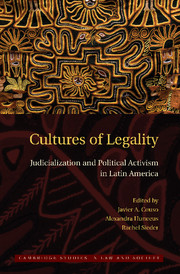Book contents
- Frontmatter
- Contents
- Contributors
- PART I INTRODUCTION
- PART II COURTS AND JUDICIALIZATION THROUGH A CULTURAL LENS
- PART III JUDICIALIZATION BEYOND THE COURTS
- 6 The Transformation of Constitutional Discourse and the Judicialization of Politics in Latin America
- 7 Legal Cultures in the (Un)Rule of Law: Indigenous Rights and Juridification in Guatemala
- 8 Political Activism and the Practice of Law in Venezuela
- 9 The Mapuche People's Battle for Indigenous Land: Litigation as a Strategy to Defend Indigenous Land Rights
- 10 Judicialization in Argentina: Legal Culture or Opportunities and Support Structures?
- 11 Novel Appropriations of the Law in the Pursuit of Political and Social Change in Latin America
- Index
- CAMBRIDGE STUDIES IN LAW AND SOCIETY
- References
11 - Novel Appropriations of the Law in the Pursuit of Political and Social Change in Latin America
Published online by Cambridge University Press: 20 May 2010
- Frontmatter
- Contents
- Contributors
- PART I INTRODUCTION
- PART II COURTS AND JUDICIALIZATION THROUGH A CULTURAL LENS
- PART III JUDICIALIZATION BEYOND THE COURTS
- 6 The Transformation of Constitutional Discourse and the Judicialization of Politics in Latin America
- 7 Legal Cultures in the (Un)Rule of Law: Indigenous Rights and Juridification in Guatemala
- 8 Political Activism and the Practice of Law in Venezuela
- 9 The Mapuche People's Battle for Indigenous Land: Litigation as a Strategy to Defend Indigenous Land Rights
- 10 Judicialization in Argentina: Legal Culture or Opportunities and Support Structures?
- 11 Novel Appropriations of the Law in the Pursuit of Political and Social Change in Latin America
- Index
- CAMBRIDGE STUDIES IN LAW AND SOCIETY
- References
Summary
INTRODUCTION
The purpose in this chapter is to develop a framework of analysis to advance our understanding of the processes that have led to the adoption of novel legal strategies by a variety of social and political actors in recent Latin American politics, as well as to examine the changing political narratives around rights and the rule of law that have accompanied these new strategies. The emphasis is on tracking what appear to be new forms of judicial activism, legal mobilization and what have been called “rights revolutions” in the region, and doing so from the broader perspective of legal culture and beyond the confines of the formal legal institutions or the courtroom.
Bearing in mind the diversity of experiences in Latin America, the emphasis of the chapter is on societies that share some of the following characteristics: where regime transition is relatively recent and brings with it a variety of political experiences connected to the struggle to redress human rights abuses of the past (with varying levels of effectiveness); where the notions of rule of law and rights-based democracy remain weak projects in reality, but have acquired greater discursive projection than at any other time of constitutional and state-building endeavors in the region; and (in some cases) where legal pluralism has acquired to varying degrees a prominent political face. These are processes that to all appearances coincide with and are causally connected to new forms and greater levels of judicial activism, or judicialization of political and social conflict.
- Type
- Chapter
- Information
- Cultures of LegalityJudicialization and Political Activism in Latin America, pp. 254 - 278Publisher: Cambridge University PressPrint publication year: 2010
References
- 13
- Cited by



